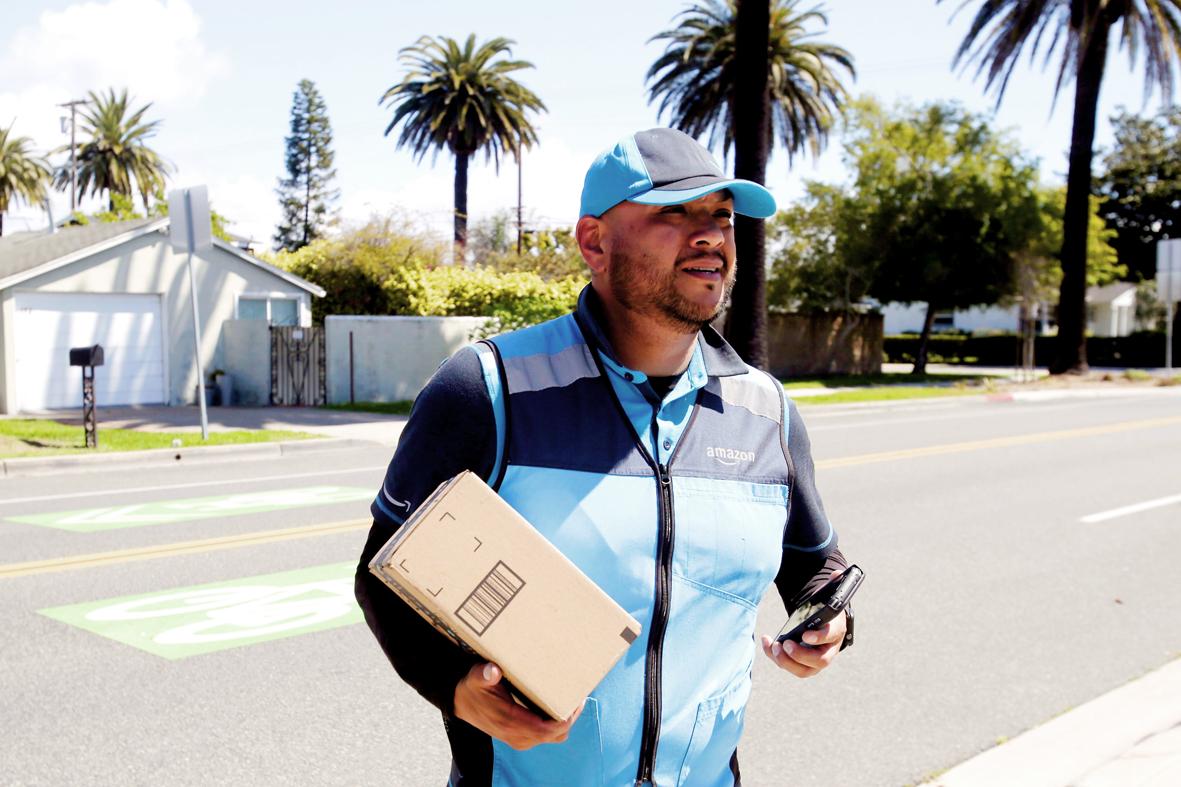Amazon.com Inc on Wednesday said it temporarily would not require sellers in its marketplace to repay loans it had made to them, as merchants confront the prospect of declining sales during the COVID-19 pandemic.
The world’s largest online retailer notified sellers that its program, known as Amazon Lending, would pause repayments beginning yesterday until April 30.
Interest would not accrue during that period, it said.

Photo: Reuters
The program has offered sums between US$1,000 and US$750,000 to merchants looking for capital to acquire inventory, expand their product lines and advertise on Amazon.
“Loan repayments will restart on May 1, 2020... You will have the same number of remaining payments once repayment resumes,” Amazon said in a seller message obtained by reporters.
More than 20,000 merchants have received loans from Amazon, the company said in 2017.
By the end of last year, Amazon stood to receive US$863 million from sellers to whom it provided financing through the lending program, according to a company filing.
The loan terms range from three to 12 months, carrying interest rates from 6 percent to 19.9 percent.
As Americans turn to online shopping while quarantined, many online sellers, who are small and medium-sized businesses, are facing cash flow constraints amid supply chain and logistics issues caused by the outbreak.
EBay Inc, another major online marketplace, on Wednesday said it would defer most selling fees for merchants for 30 days.
Amazon’s offer might provide relief to sellers, some of whom could be hard hit by Amazon’s recent decision to restrict its US and European fulfillment services to household, medical and other essential goods during the outbreak.
Merchants of popular items from toys to apparel have worried that the temporary ban on stocking goods in Amazon warehouses, on which they depend for delivery, would mean low sales and difficulty paying back loans.
Jamison Philippi, an Amazon seller of toys and video games in Hackensack, New Jersey, told reporters that his income could drop by 75 percent just as he had a loan repayment of about US$3,500 due to Amazon on Wednesday next week.
“That’s super awesome. I cheered when I got that e-mail. That relieves a lot of stress right now,” Philippi said.
Amazon’s move came after at least one rival offered sellers relief.
Ricardo Pero, chief executive of lending company SellersFunding, last week said he was easing terms to help sellers on Amazon and other marketplaces navigate the rapidly changing retail market.
SellersFunding offers lines of credit and term loans to new and existing borrowers. Both products offer a 90-day interest-only period.
Amazon, which had won customers by continually making shipping faster over the years, has now slowed delivery to weeks in some cases in order to manage a flood of orders.
That could also dampen merchants’ sales as shoppers look elsewhere for goods.

To many, Tatu City on the outskirts of Nairobi looks like a success. The first city entirely built by a private company to be operational in east Africa, with about 25,000 people living and working there, it accounts for about two-thirds of all foreign investment in Kenya. Its low-tax status has attracted more than 100 businesses including Heineken, coffee brand Dormans, and the biggest call-center and cold-chain transport firms in the region. However, to some local politicians, Tatu City has looked more like a target for extortion. A parade of governors have demanded land worth millions of dollars in exchange

Hong Kong authorities ramped up sales of the local dollar as the greenback’s slide threatened the foreign-exchange peg. The Hong Kong Monetary Authority (HKMA) sold a record HK$60.5 billion (US$7.8 billion) of the city’s currency, according to an alert sent on its Bloomberg page yesterday in Asia, after it tested the upper end of its trading band. That added to the HK$56.1 billion of sales versus the greenback since Friday. The rapid intervention signals efforts from the city’s authorities to limit the local currency’s moves within its HK$7.75 to HK$7.85 per US dollar trading band. Heavy sales of the local dollar by

Taiwan Semiconductor Manufacturing Co’s (TSMC, 台積電) revenue jumped 48 percent last month, underscoring how electronics firms scrambled to acquire essential components before global tariffs took effect. The main chipmaker for Apple Inc and Nvidia Corp reported monthly sales of NT$349.6 billion (US$11.6 billion). That compares with the average analysts’ estimate for a 38 percent rise in second-quarter revenue. US President Donald Trump’s trade war is prompting economists to retool GDP forecasts worldwide, casting doubt over the outlook for everything from iPhone demand to computing and datacenter construction. However, TSMC — a barometer for global tech spending given its central role in the

An Indonesian animated movie is smashing regional box office records and could be set for wider success as it prepares to open beyond the Southeast Asian archipelago’s silver screens. Jumbo — a film based on the adventures of main character, Don, a large orphaned Indonesian boy facing bullying at school — last month became the highest-grossing Southeast Asian animated film, raking in more than US$8 million. Released at the end of March to coincide with the Eid holidays after the Islamic fasting month of Ramadan, the movie has hit 8 million ticket sales, the third-highest in Indonesian cinema history, Film